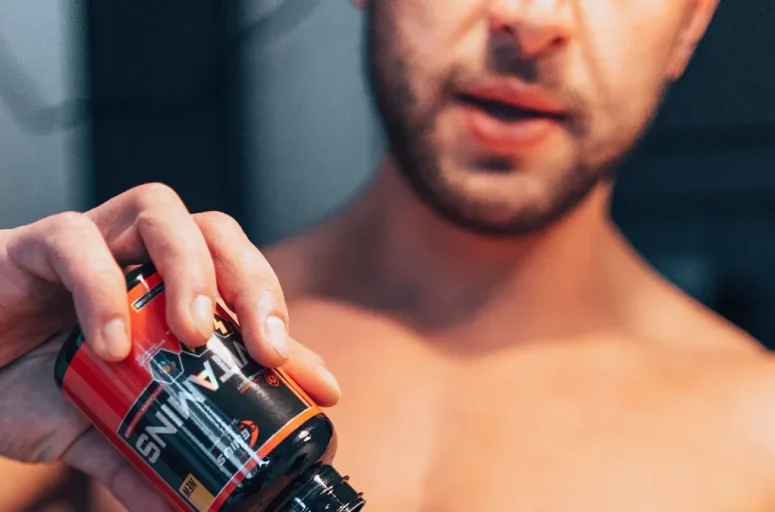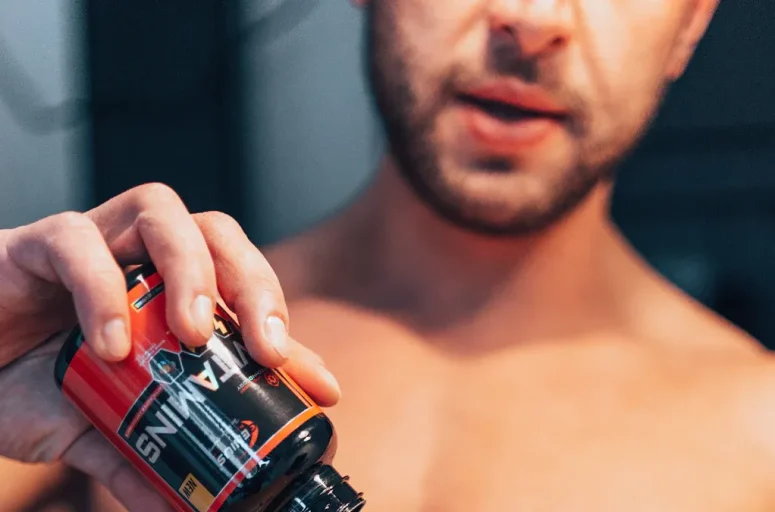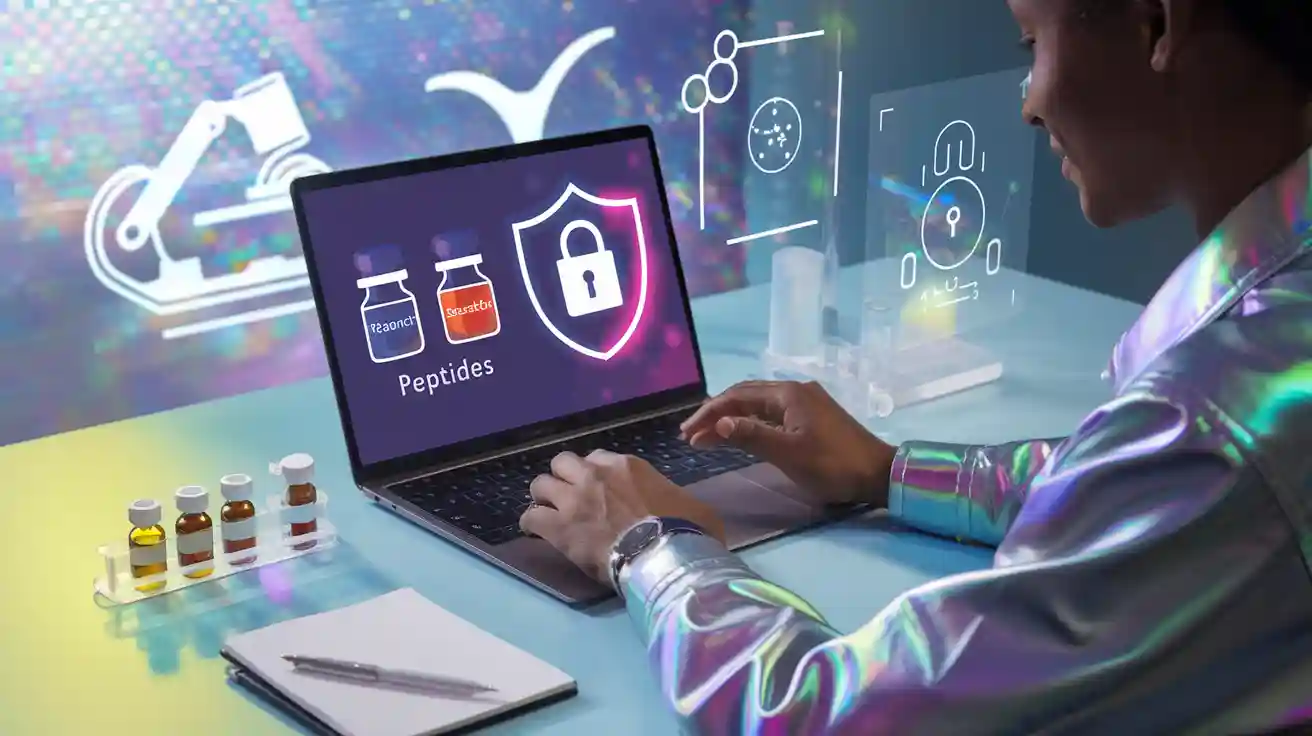
When you source research peptides online, you must focus on safety, legality, and quality. Regulations have tightened in recent years, and the FDA has banned many compounded peptides due to concerns about impurities and safety risks. Some companies now sell peptides labeled for research use only, but these products often lack regulation and can be risky. Reliable suppliers provide lab reports and clear product information. Always talk with a healthcare professional before making decisions.
This article does not offer medical advice. I am not a doctor.
Key Takeaways
Always choose reputable suppliers who show clear company information and provide multiple contact options.
Look for third-party lab reports and certificates of analysis to verify peptide purity and authenticity.
Check product labels for batch numbers, expiration dates, and matching details on certificates to ensure quality.
Avoid suspiciously low prices and sellers making exaggerated claims or hiding product details.
Use secure payment methods like credit cards or PayPal to protect your purchase and personal data.
Understand and follow local laws and regulations about buying and using research peptides.
Start with small orders to test suppliers and keep records of all transactions and communications.
Consult healthcare professionals before using peptides and always use them only for research purposes.
Source Research Peptides Online
When you source research peptides online, you need to focus on supplier transparency and product documentation. Reliable sellers help you avoid risks by providing clear information and verified reports. This section will guide you through the key features to look for in reputable online peptide suppliers.
Supplier Transparency
Company Info
You should always check the company’s background before you buy peptides. Trustworthy sellers display their business name, physical address, and company registration details on their website. They often highlight their manufacturing processes and show a proven track record with positive customer reviews. These sellers avoid exaggerated claims about product effectiveness and demonstrate compliance with legal and regulatory standards.
Tip: Reputable online retailers usually ship from established US or European locations. This helps ensure product quality and regulatory compliance.
Contact Details
A reputable seller provides multiple ways for you to reach them. Look for a phone number, email address, and sometimes a live chat option. Sellers who hide their contact details or only offer a web form may not be trustworthy. Responsive customer service is a sign of a reliable business. If you have questions about peptides or need help with authenticity verification, you should get clear answers quickly.
Lab Reports
Third-Party Testing
The importance of third-party testing cannot be overstated when you source research peptides. Trusted sources for peptide purchases use independent labs to verify the identity and purity of their products. You should expect to see third-party lab test results for each batch. These reports often include details from peptide purity testing methods like HPLC (High-Performance Liquid Chromatography) and MS (Mass Spectrometry).
To verify the authenticity of these reports, follow these steps:
Request full lab reports, not just summaries, and check for raw data.
Confirm that the testing lab has proper accreditations and follows standardized protocols.
Use multiple independent labs to cross-check results.
Look for a unique key or code on the report and verify it with the lab’s official database.
Be cautious if you see perfect purity scores or inconsistent results across different labs.
Sellers who provide vague or self-branded lab reports without verifiable information should be avoided. Reliable sellers maintain an archive of recent and batch-specific lab reports, not outdated or reused ones.
Certificates of Analysis
Most reputable online peptide suppliers include certificates of analysis (CoAs) with their products. A recent study found that all 98 synthetic peptides analyzed for research came with a CoA stating at least 95.0% purity, even though actual purity sometimes fell short. This shows that providing CoAs is a standard practice among reputable sellers. These certificates give you important details about peptide purity testing, batch numbers, and expiration dates. You should always review the CoA before you buy peptides to confirm the product’s quality.
Note: Always check that the CoA matches the batch number on your product. This helps ensure you receive the correct peptides and supports authenticity verification.
When you source research peptides online, focus on transparency, documentation, and third-party lab test results. These steps help you avoid low-quality or counterfeit products and make sure you buy peptides from reputable online retailers.
Disclaimer: This article is for informational purposes only. I am not a doctor and do not provide medical advice or recommendations.
Product Quality
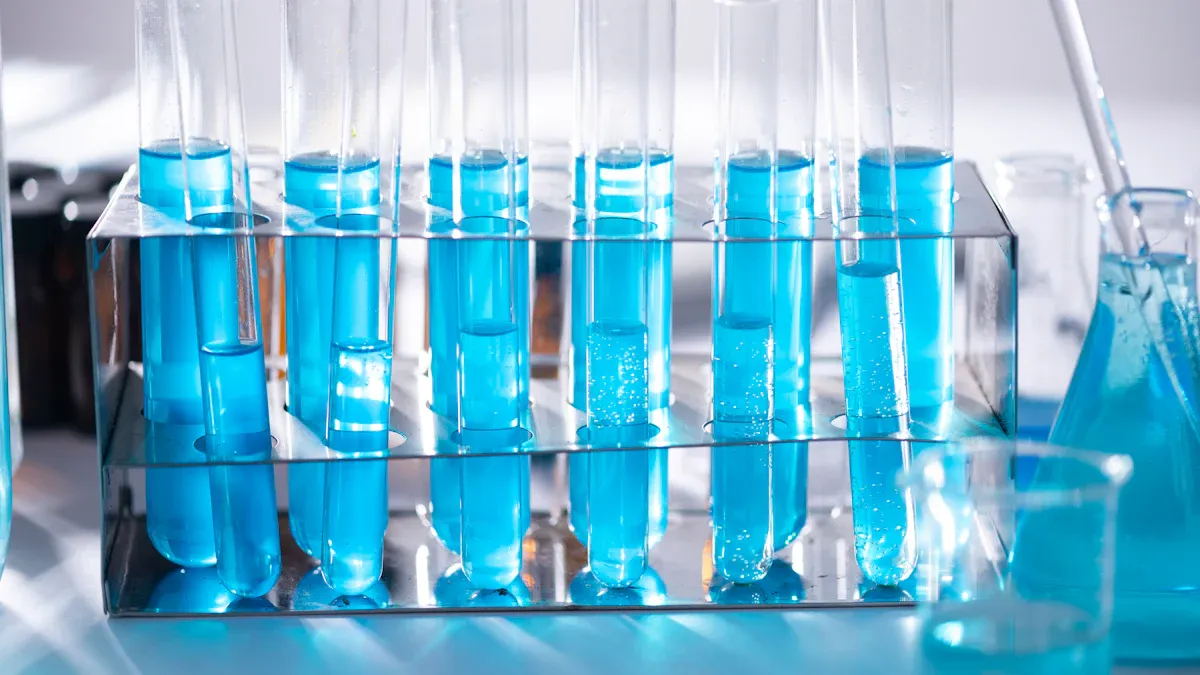
When you buy peptides for research, you need to focus on quality. High-quality peptides help you achieve reliable results and protect your experiments from contamination or error. You should always check for clear labeling, batch numbers, and up-to-date purity reports. These details show that the supplier follows strict peptide quality control and meets scientific standards.
Peptides: Quality and Purity
Labeling Standards
Proper labeling is the first sign of good peptide quality control. Each vial or package should display the peptide name, sequence, batch number, and expiration date. Labels must be easy to read and match the information on the certificate of analysis. If you see vague or missing labels, you should question the product’s quality.
Purity Reports
Peptide purity is a key factor in research. Suppliers use advanced testing methods like HPLC and mass spectrometry to confirm purity. You should always review the purity report before using any peptides. The report should show the percentage of purity and the methods used for testing. Most research peptides fall into specific purity categories, each suited for different applications.
Purity Range | Typical Purity % | Applications |
|---|---|---|
Crude/Desalted | ~50-70% | Initial peptide screening, high-throughput screening, lead generation in pharmaceutical development |
Mid-range Purity | >70-85% | Antibody production, ELISA, enzyme substrate studies, epitope mapping, affinity purification, bioassays |
High Purity | >90-95% | Quantitative bioassays, receptor-ligand interaction studies, quantitative inhibition and phosphorylation assays |
Ultra High Purity | >98% | In vivo studies, clinical trials, drug development, NMR, protein crystallography, SAR studies |
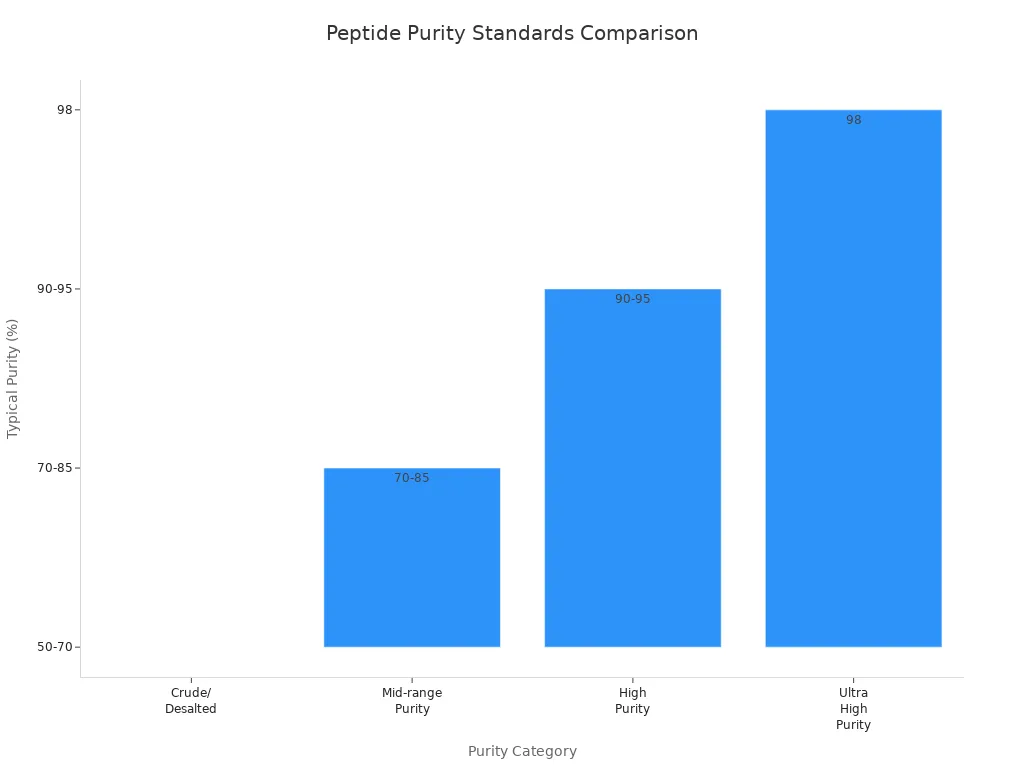
You should choose the purity level that matches your research needs. For example, high purity or ultra-high purity peptides are best for sensitive experiments or clinical studies. Always make sure the supplier provides recent purity reports as part of their peptide quality control process.
Batch Numbers
Expiration Dates
Batch numbers play a big role in peptide quality control. Each batch number links the product to its certificate of analysis and purity report. You can use the batch number to check the expiration date and confirm that the peptides are still safe for research. Expired peptides may lose quality or become unsafe.
Tracking Origin
Batch numbers also help you track the origin of your peptides. If you have a problem with a batch, you can trace it back to the supplier and the original testing data. This traceability supports safety, regulatory compliance, and reliable results. Suppliers who use batch numbers and third-party testing show a strong commitment to peptide quality control.
Tip: Always keep a record of batch numbers and related documents. This helps you maintain a clear paper trail for audits and future reference.
Quality peptides always come with clear labeling, batch numbers, and up-to-date purity reports. These features show that the supplier follows strict peptide quality control and meets scientific standards for research.
Disclaimer: This article is for informational purposes only. I am not a doctor and do not provide medical advice or recommendations.
Identifying Counterfeit Peptides
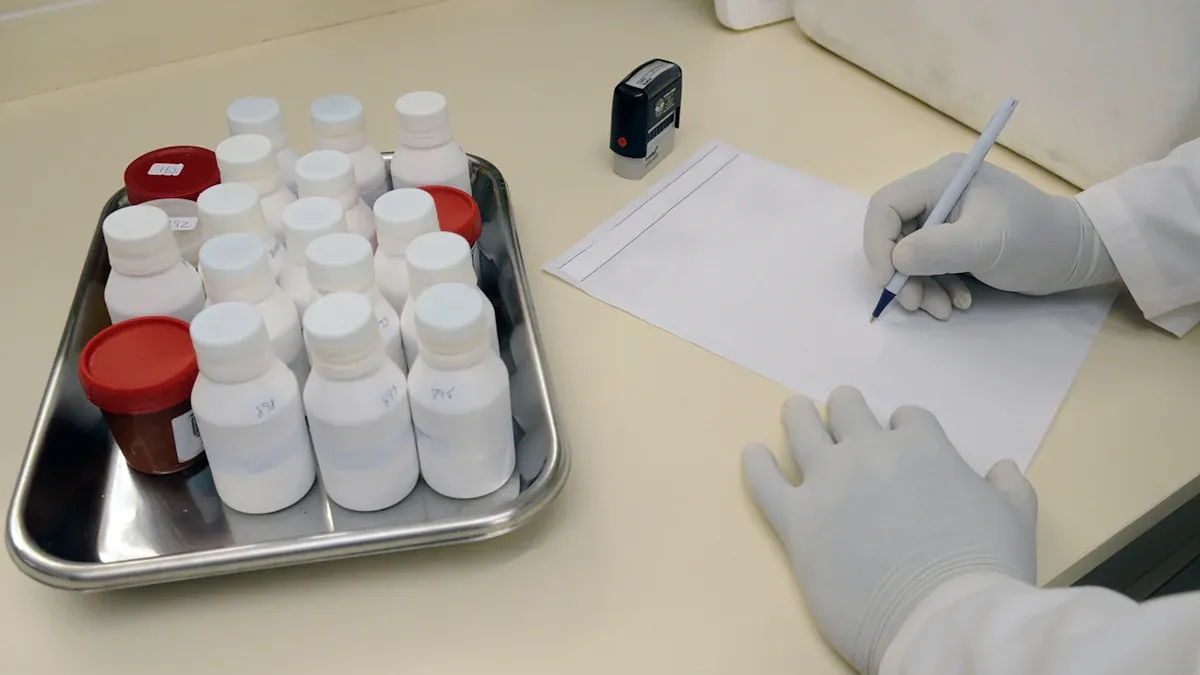
When you buy peptides online, you need to know how to spot fake products. Identifying counterfeit peptides protects your research and keeps you safe from unreliable sellers. Many online marketplaces have sellers who offer products that look real but do not meet quality standards. You must learn to recognize warning signs and avoid risky purchases.
Red Flags
Counterfeit peptides often come with clear warning signs. You can spot these by paying attention to price, promises, and product details.
Low Prices
You may see peptides sold at prices much lower than average. Cheap products often signal poor quality or fake ingredients. Sellers who offer peptides without a prescription or at a deep discount usually do not follow safety rules. These sellers may use unverified online pharmacies or unknown third-party platforms. You risk buying peptides that contain harmful substances or no active ingredients at all.
Flashy Promises
Some sellers use flashy promises to attract buyers. You might notice exaggerated claims about effectiveness or guaranteed results. These promises often sound too good to be true. Sellers may flood their pages with suspicious reviews, either all positive or many negative ones. Fake reviews can hide the truth about product quality. You should stay alert when you see sellers making bold claims or showing inconsistent feedback.
Tip: Always check the packaging and appearance of peptides. Counterfeit products may have wrong logos, strange colors, or packaging that does not match the supplier’s usual style.
Lack of Documentation
Legitimate suppliers provide clear documentation for every batch of peptides. Counterfeit sellers often skip this step or give vague information.
Vague Descriptions
You should read product descriptions carefully. Sellers who use unclear language or avoid giving details about the peptide’s sequence, purity, or origin may not be trustworthy. Vague descriptions make it hard for you to know what you are buying. Reliable sellers list all important facts and answer your questions directly.
Missing Lab Reports
Lab reports prove the quality and authenticity of peptides. Trusted suppliers share certificates of analysis (COA) from independent labs. These reports show the peptide’s identity and purity, often using HPLC and mass spectrometry. For clinical-grade peptides, the COA covers more details, such as water content and safety checks. Sellers who do not provide lab reports or only offer summaries without real data should raise concern. You should always ask for full lab reports before making a purchase.
What to Look For | Why It Matters |
|---|---|
Certificate of Analysis (COA) | Confirms identity and purity |
Third-party lab validation | Adds unbiased verification |
Batch number and expiration date | Ensures traceability |
Detailed testing methods | Supports research reproducibility |
Alert: Avoid sellers who cannot provide verifiable lab reports or clear product information. Counterfeit peptides can ruin your research and pose health risks.
You must stay cautious when buying peptides online. Watch for low prices, flashy promises, vague descriptions, and missing documentation. Reliable suppliers always provide proof of quality and answer your questions. Protect your research by choosing sellers who value transparency and safety.
Disclaimer: This article is for informational purposes only. I am not a doctor and do not suggest any medical use or recommendations.
Safe Purchasing
When you buy peptides online, you need to make sure your purchase is secure and your information stays private. Reliable sellers use trusted payment methods, protect your data, and offer clear shipping and return policies. These steps help you avoid scams and ensure you receive high-quality products.
Payment Methods
Trusted Options
Choose payment methods that offer buyer protection. Credit cards and PayPal are popular choices because they allow you to dispute charges if something goes wrong. Many reputable sellers accept these options. They also use secure payment gateways to keep your financial details safe.
Methods to Avoid
Avoid using wire transfers, cryptocurrency, or prepaid gift cards. These methods offer little to no protection if you face problems with your order. Scammers often prefer these payment types because you cannot reverse the transaction. Always check the payment page for signs of security, such as a lock icon in the browser bar.
Data Protection
Secure Websites
You should always check if the website looks professional and modern. A secure site shows attention to detail and builds trust. Look for these signs:
The website uses HTTPS in the address bar.
The design appears clean and up-to-date.
You find real customer reviews, especially on independent forums.
The site provides clear shipping policies and delivery timelines.
Customer support is easy to reach and responds quickly.
These features show that the seller values your privacy and the quality of their service.
Privacy Policies
Read the privacy policy before you buy peptides. A good policy explains how the company collects, stores, and uses your information. Reliable sellers never share your data with third parties without your consent. If you cannot find a privacy policy, consider shopping elsewhere.
Shipping & Returns
Customer Support
Strong customer support increases your confidence when buying peptides. You should expect fast responses to your questions and help with any issues. Many buyers trust sellers who answer return requests within 24 hours and offer clear solutions. Good service, along with product quality, makes a big difference in your experience.
Refund Policies
Clear refund and return policies protect you if something goes wrong. Most reputable sellers allow returns of new, unopened items within 30 days. They process refunds after inspecting the returned product. Some sellers only offer exchanges for damaged or defective items. Check the table below for common shipping and return practices:
Policy Aspect | Details |
|---|---|
Order Processing Time | |
Shipping Methods | UPS, USPS, FedEx; tracking provided |
Shipping Destinations | US and Canada (sometimes US only) |
Return Eligibility | New, unopened, unused, original packaging within 30 days |
Refunds | Refund minus shipping fees; processed after inspection |
Exchanges | Only for defective or damaged items |
Note: Good customer support and fair refund policies build trust and encourage repeat purchases. They also reduce the risk of buying from unreliable sellers.
You should always follow safe peptide usage practices and choose sellers who value your privacy and satisfaction. These steps help you get high-quality peptides and protect your information.
Disclaimer: This article is for informational purposes only. I am not a doctor and do not suggest any medical use or recommendations.
Legal Compliance
Understanding legal compliance is essential when you source research peptides online. Laws and regulations change often, and you must stay informed to avoid legal trouble. This section explains how local laws, upcoming 2025 regulations, and intended use affect your ability to buy and use research peptides safely.
Local Laws
Regional Differences
Legal requirements for research peptides differ between countries and even states. You must know the rules in your area before you order.
In the United States, only peptides approved by the FDA for medical use are legal with a prescription from a healthcare provider.
Peptides not approved by the FDA can be bought for scientific research only. You cannot use them for human or veterinary purposes.
You must keep proper documentation and follow any licensing requirements.
In Europe, rules are less strict in some countries, but selling peptides for human use can still cause legal problems.
You are responsible for checking customs and local regulations before importing peptides. Customs may block or seize shipments if you do not comply.
Both regions stress that peptides are not for human use outside approved research. Misuse can lead to legal penalties.
Note: Sellers often state that they are not responsible for customs issues. You must understand your country’s laws before you buy.
2025 Regulations
New laws in 2025 will make online peptide sales even stricter, especially in the United States.
States like New York will ban sales to anyone under 18. New Jersey will require parental consent for minors. Other states plan similar rules.
Sellers must use age verification systems that check your location and enforce local laws.
Marketing that mentions muscle growth, fat loss, or anti-aging will face close scrutiny. Even subtle claims can trigger enforcement.
Non-compliance can lead to fines, lawsuits, or business shutdowns.
Payment processors and shipping companies may refuse to work with sellers who do not follow the rules.
International shipping adds more legal risks, including customs delays or seizures.
State/Region | Key 2025 Rule | Enforcement Focus |
|---|---|---|
New York | No sales to minors under 18 | Age verification, marketing |
New Jersey | Parental consent for minors | Age verification, documentation |
California, Texas, etc. | Similar age restrictions | Local compliance, marketing |
United States (federal) | No therapeutic claims, FDA oversight | Labeling, payment processing |
Europe | Varies by country | Customs, intended use |
Intended Use
Research Only
You must use research peptides only for scientific or laboratory research. These products are not for human or veterinary use, medical treatment, or cosmetic purposes. Suppliers make this clear to avoid legal issues and protect both you and themselves.
Products are labeled “for research use only.”
Suppliers warn against human consumption, resale, or recreational use.
You must know the health and safety risks and follow all laws.
Peptides have not been tested for safety or effectiveness in food, drugs, or cosmetics.
Using peptides for anything other than research can lead to serious risks:
There is no guarantee of potency or purity.
Improper storage or shipping can make peptides unsafe.
Legal and ethical risks increase if you misuse these products.
Supplier Disclaimers
Reputable suppliers include strong disclaimers to clarify intended use and limit liability.
Suppliers state they are not pharmacies and do not provide medical advice.
Buyers must be qualified researchers and agree not to misuse products.
Suppliers disclaim responsibility for damages from improper use.
Products may not appear on regulatory inventories, so you must check compliance.
Disclaimer: This article is for informational purposes only. I am not a doctor and do not suggest any medical use or recommendations. Always consult a licensed healthcare professional for health-related decisions.
Staying informed about local laws, new regulations, and intended use helps you source research peptides safely and legally. Always read supplier disclaimers and follow best practices to protect yourself and your research.
First-Time Buyers
Starting your journey as a first-time buyer of research peptides can feel overwhelming. You can reduce risks and build confidence by following a few simple steps. This section will help you make smart choices and avoid common mistakes.
Small Orders
Risk Reduction
Begin with small orders when you try a new supplier. This approach limits your financial risk and lets you check product quality before making larger purchases. Many first-time buyers make the mistake of placing big orders with unverified vendors. You should avoid this by starting small and observing how the supplier handles your order, shipping, and communication.
Supplier Testing
Use your first order as a test. Check if the supplier provides clear product information, batch numbers, and lab reports. Review their shipping process and see if they send tracking numbers right away. Reliable suppliers often have positive customer reviews and respond quickly to questions. If you notice delays or missing documentation, consider looking for another source.
Communication
Asking Questions
Good communication helps you judge a supplier’s reliability. Ask clear questions about product quality, testing methods, shipping options, and payment terms. Request details like company information, product catalog, and certifications. A trustworthy supplier will answer your questions directly and provide supporting documents.
Evaluating Responses
You can evaluate supplier responses by following these steps:
1. Clearly state your questions and explain why you need the information. 2. Use a checklist or scorecard to compare answers on quality, cost, and compliance. 3. Set a deadline for replies to see how quickly the supplier responds. 4. Review both objective data (like certifications) and subjective impressions (such as tone and helpfulness). 5. Compare responses using a simple table or chart to find the best fit.
Tip: Suppliers who provide detailed answers and meet deadlines show they value your business.
Record Keeping
Save Transactions
Always save records of your orders, payments, and shipping details. Keeping a paper trail helps you resolve disputes if problems arise. For example, tracking numbers and receipts can prove your case if you need to request a refund or file a claim.
Documentation
Store all emails, lab reports, and certificates related to your purchase. Organized documentation protects you from fraud and helps you track product quality over time. This practice also supports your research by making it easy to review past orders and supplier performance.
Note: Many first-time buyers forget to keep records or ask the right questions. Avoid this mistake to protect your investment and ensure safe, reliable research.
Disclaimer: This article is for informational purposes only. I am not a doctor and do not suggest any medical use or recommendations.
Sourcing research peptides online requires careful steps to protect your safety and research.
Check for proper licensing, regulatory compliance, and recent Certificates of Analysis.
Understand and follow local laws and regulations.
Consult healthcare professionals before use.
Stay updated on regulatory changes and educate yourself about product quality.
Ongoing education helps you spot counterfeit products and avoid health risks.
Disclaimer: I am not a doctor and do not provide medical advice or recommendations.
FAQ
What are research peptides?
Research peptides are short chains of amino acids. Scientists use them for laboratory experiments. You should not use them for human or veterinary purposes. Suppliers label them “for research use only.”
How do I verify a peptide supplier’s legitimacy?
Check for clear company information, contact details, and third-party lab reports. Reliable suppliers provide certificates of analysis and batch numbers. You can also read independent customer reviews.
Why do purity levels matter in research peptides?
Purity levels affect your experiment’s accuracy. High-purity peptides reduce the risk of contamination. Always review the supplier’s purity reports before you buy.
Can I use research peptides for personal use?
No, you should not use research peptides for personal, medical, or cosmetic purposes. These products are not approved for human consumption. Using them outside research can be unsafe and illegal.
What payment methods are safest for buying peptides online?
Credit cards and PayPal offer buyer protection. Avoid wire transfers, cryptocurrency, or prepaid cards. These methods make it hard to recover your money if you face problems.
How do I spot counterfeit peptides?
Look for warning signs like low prices, vague product descriptions, and missing lab reports. Reliable sellers provide clear documentation and answer your questions directly.
What should I do if my order does not arrive?
Contact the supplier’s customer support. Provide your order number and shipping details. If you paid with a protected method, you can file a dispute for a refund.
Disclaimer: This FAQ is for informational purposes only. I am not a doctor and do not provide medical advice or recommendations.
